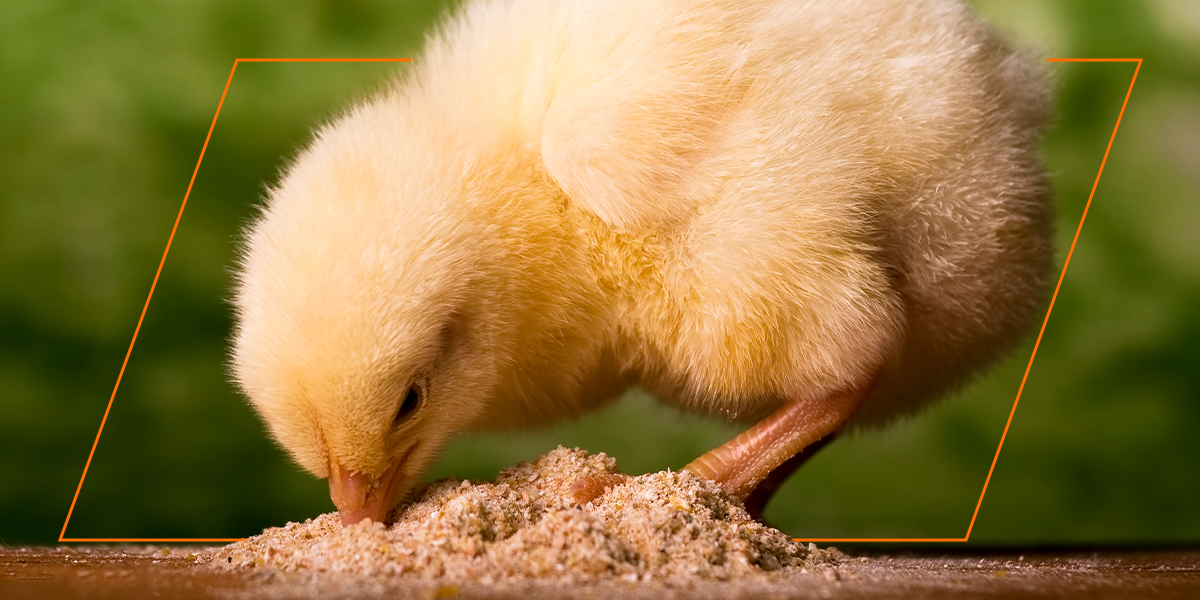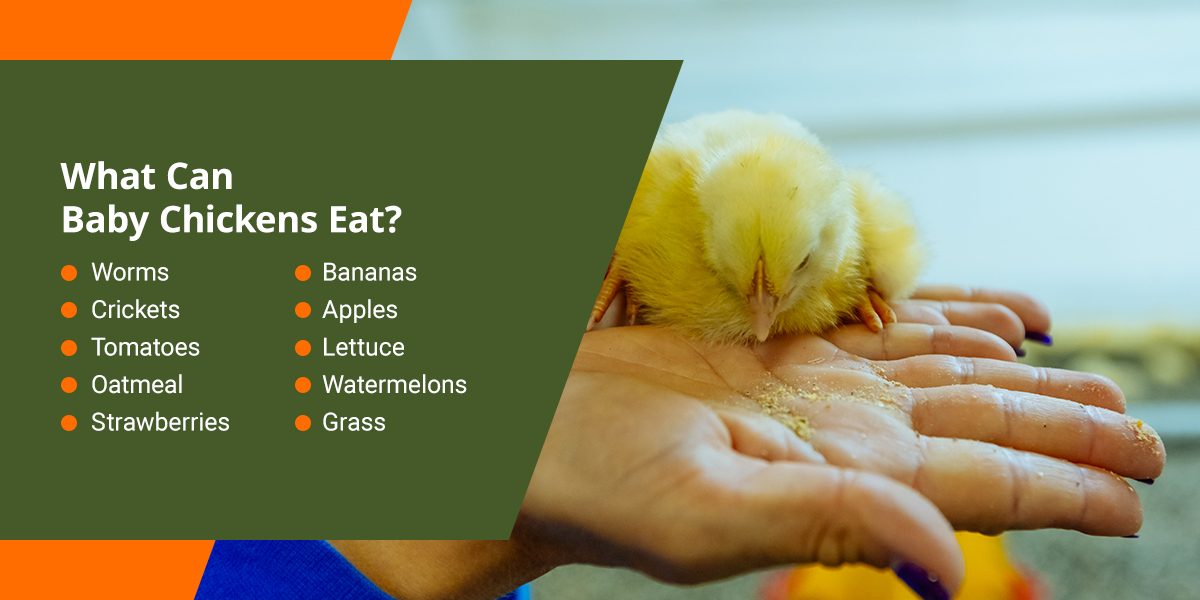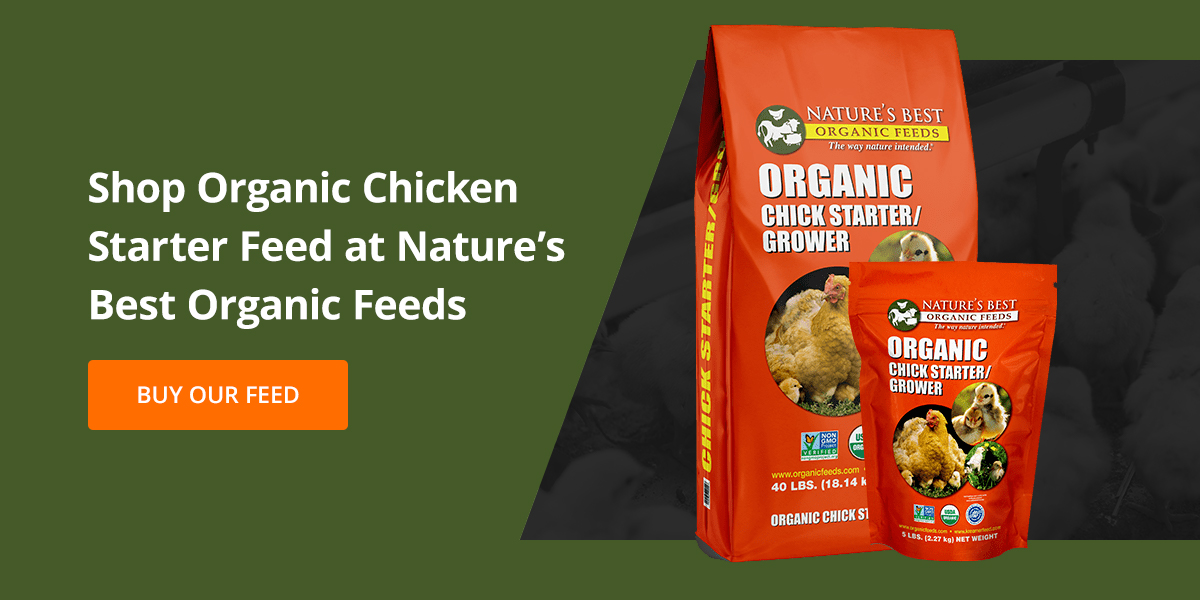
Types of Food Baby Chicks Can and Cannot Eat
Chickens make great companions. Aside from providing fresh eggs, they are wonderful family animals and can even improve the health of your lawn and garden. Best of all, baby chicks are low maintenance and can help reduce leftover waste in your kitchen.
A baby chicken’s diet is extremely versatile, but there are some foods to rethink before throwing them into the coop. Here, we’ll outline what to feed baby chicks, the nutrient-dense foods they love, and the leftovers to keep in your compost pile.
The Growing Trend of Chicken-Rearing
Although less than 2% of Americans live on farms, more than 12 million people in the United States own backyard chickens. One of the primary reasons more people are jumping on the trend of owning chickens is to get fresh eggs.
If you and your family are considering purchasing baby chicks of your own or recently bought them and want to learn more about them, here are some benefits of raising chickens at home:
- Get farm-fresh food for less: Raising chickens provides you with your own natural food source. You and your family can reap the health benefits of fresh eggs from chickens that are not treated with added hormones, preservatives, or antibiotics, so you can be confident that your eggs are more nutritious and flavorful. It may also save a few dollars at the grocery store.
- Improve your garden: Having chickens roam in your garden naturally aerates the soil and may improve the health of your flowers, plants, and vegetables. Some people even use chicken manure as fertilizer for their garden, but always use caution when handling droppings. To avoid contact with bacteria, try aging the manure in compost before using it.
- Implement natural pest control: Chickens love digging and pecking in the dirt for insects. They can naturally keep these bugs away and get exercise as they scratch and look for tasty treats.
- Reduce waste: Chickens can eat many different foods aside from their regular feed, so you can toss them your fresh produce scraps instead of throwing the leftovers away.
- Promote an outdoor lifestyle for the family: Chickens make great family pets. Your kids will love holding them and collecting their eggs every day. They’re also a good learning opportunity for young ones to see the value and responsibility involved in caring for an animal.
What Are the Essential Nutrients for Baby Chickens?
Young chickens require a more nutrient-dense diet than their adult counterparts, and it’s important they get the right balance of nutrients. Here’s what to feed chicks and each food’s nutritional value:
- Protein: After hatching, a chick’s diet should include approximately 18% to 20% protein. Protein builds chicks’ muscles, promoting strength and bone integrity during their crucial developmental stages. As baby chicks reach 19 weeks old, gradually taper their protein intake to about 16% of their diet.
- Vitamins: All poultry require fat- and water-soluble vitamins. Specifically, they require all vitamins except vitamin C, including vitamins A, D, E and K, niacin, folic acid, biotin, thiamine, and riboflavin.
- Minerals: Minerals are equally important. Baby chicks require a diet with calcium, phosphorus, magnesium, iron, and copper, among others.
- Grains: Most chicken feeds incorporate healthy grains, like corn, wheat, and soybean meal. These grains act as sources of vitamins, oil and protein, which all poultry require for energy.
- Fats: Most of a chicken’s fat content comes from oils that contain linoleic acid, an important fatty acid. Fatty acids break down vitamins and minerals, allowing chickens to receive all of their benefits.
Baby chicks’ feed should provide at least 90% of their nutrition, with the remaining 10% from their pasture. On top of their feed, poultry requires a constant source of water. Chickens drink almost three times their weight in water. A good water-to-chicken ratio is one quart per four chickens.
Essential Foods for Baby Chick Growth
The best food you can give your baby chicks is organic chicken starter feed. The foods listed above are healthy for chicks — and you’re encouraged to recycle any leftovers — but they may receive too many or too little nutrients.
Organic chicken starter feed is packed with essential nutrients like these:
- Organic carbs, including corn, soybean meal, and wheat
- Organic soybean oil
- Calcium carbonate
- Zinc sulfate
- Copper sulfate
- Calcium iodate
- Vitamin D3
- Vitamin E
- Vitamin A
- Vitamin B12
- Riboflavin
- Folic acid
Opting for organic chicken starter feed over non-organic alternatives ensures your baby chicks receive non-medicated and non-GMO nutrients. Natural feeds contain little to no cheap filler products, giving you more nutrients for your money and your chickens a healthier lifestyle.

What Do Baby Chickens Eat?
If you want to know what homemade foods can double as chick feed, consider incorporating these nutrient-rich foods:
1. Insects and Worms
Chickens love pecking at the ground to find insects and worms. You can provide red worms and mealworms as a good source of protein. Do so in moderation to prevent overwhelming their systems.
Chickens can also eat different types of insects, including crickets. Again, give them crickets in moderation to provide essential nutrients, carbs, fats, and protein.
2. Tomatoes
Your baby chicks will love to eat tomatoes, and they contain plenty of essential vitamins like vitamin K, fiber, potassium, folic acid, and antioxidants. However, they cannot eat the plants, leaves, or flowers on the tomatoes because they contain a poisonous substance called solanine. Be sure to clear off any of the leaves before tossing your tomatoes into their coop!
3. Oatmeal
Oats are a great source of protein, vitamins, and minerals your baby chicks need. They can have both cooked, warm oatmeal or raw oats from time to time. You can even add plain yogurt or birdseed to the oatmeal for added nutrients.
4. Strawberries
Baby chicks love to eat fruit, especially strawberries. Strawberries contain many minerals and vitamins, such as potassium, vitamin B, copper, iron, and magnesium. This fruit is also a great source of anti-inflammatory antioxidants for your baby chicks.
5. Bananas
Provided your bananas are ripe or overripe, your baby chicks will happily take them off your hands. Bananas are a good source of magnesium and copper, provide healthy carbs, and are high in pyridoxine and vitamin B6. As bananas ripen, their sugar content increases, so feed them to your chicks sparingly.
6. Apples
Baby chicks can eat apples, but you should chop them up and remove any seeds for easier consumption and digestion. Applesauce is another good apple alternative for chick food. Apples are a good source of carbs and contain fiber, potassium, and vitamin K, too.
7. Lettuce
Can chickens eat lettuce? Yes. You can feed certain types of lettuce to your baby chicks, including turnip greens, chard, and kale. Romaine lettuce is particularly nutritious for your baby chicks, as it’s high in potassium, magnesium, phosphorus, folate, and vitamin K. Be sure to avoid giving them iceberg lettuce, as it may give your chicks diarrhea.
8. Watermelons
While baby chicks cannot consume watermelon seeds or rinds, they can eat the inside of the fruit. On days that are especially hot, like during the summer, your baby chicks will love to peck at the cool, fresh fruit for extra hydration and flavor. Otherwise, watermelons provide fewer essential nutrients than chick food.
9. Grass
Adult hens typically peck through grass for insects and eat any smaller pieces of grass. Usually, day or week-old chicks won’t show much interest in eating grass. Some owners give their chicks the option, however, because it encourages foraging.
What Not to Feed Your Baby Chicks
Some of your groceries are best left for your compost pile. Foods that baby chickens cannot eat include:
- Beans: Dried or raw beans are fatal to chickens of all ages. If you feed beans to chicks, ensure you soak them in cold water for at least five hours and cook them properly first.
- Onions: Raw onions contain sulfoxides, which can destroy your chickens’ red blood cells.
- Chocolate: Chocolate contains theobromine and caffeine, which are toxic to several animals, including chickens. The darker the chocolate, the more dangerous. A few accidental crumbs are unlikely to cause major damage, but too much can be fatal.
- Avocados: Avocado pits and skins contain persin, which is toxic to chickens. However, they can eat avocado flesh as long as you’re sure you’ve removed all traces of the skin.
- Eggplant: Chickens can eat eggplant flesh in moderation, but the stems, leaves, and flowers contain solanine, which is harmful to chickens.
- Peanut shells: The nuts themselves are nutrient-rich in moderation, provided they have no salt or added oils. The shells, however, are tough and dense, which can cause digestive issues.
- Moldy Bread: Anything moldy can harm your chickens. While some mold can be good for them, there’s no way to tell whether you’re helping or hurting, so it’s best to avoid it altogether.
- Rhubarb: Rhubarb leaves contain oxalic acid, which causes liver damage in hens.
- Pickles: Pickles contain high levels of salt and preservatives. While your chickens can eat small amounts, they are harmful if consumed in small quantities.
Most chickens instinctively avoid these toxic foods. If your baby chicks do consume these toxins and you notice illness symptoms, give them plenty of access to electrolytes and extra nutrients. Chickens heal themselves over time in less severe cases.
Monitoring Chick Health Through Their Diet: What to Do If a Baby Chicken Is Not Eating or Drinking
Despite what many people may think, baby chicks don’t usually need to drink or eat the first day or so after hatching, but here are some things you can do if you have a chick that appears weak:
- Warmth: Ensure your baby chicks or hatchlings are warm enough. Weak chicks may not have the energy to find their way to the warmth, so help them regulate their body temperature with a heat lamp and check that it’s between 95 and 97 degrees F at all times.
- Pasting: Baby chicks can commonly get droppings dried to their bottoms, which can be caused by low-quality feed, fluctuating temperatures, and stress. Check daily when they’re babies to ensure there is no pasting.
- Hydration: Sometimes, baby chicks are more thirsty than hungry. Be sure that they always have access to plenty of clean, room-temperature water. For weak chicks, you can also add a few drops of sugar water to help give them an energy boost, although this provides no nutrition. You can also encourage them to drink by gently dipping their beaks into the water.
Baby chickens are good at eating what they need. Ensure your chicks have a constant supply of organic chicken starter feed and refill their supply as needed.
Because baby chicks and adult chickens require different amounts of nutrients, it’s best to separate them until the chicks are at least two months old. Plus, older chickens tend to be aggressive with smaller chicks, sometimes bullying them away from food. Keep an eye on every chick and make sure they’re all getting an equal share of chick food.
How Much Should You Feed Baby Chicks?
Baby chickens are good at eating what they need. Ensure your chicks have a constant supply of organic chicken starter feed and refill their supply as needed.
Because baby chicks and adult chickens require different amounts of nutrients, it’s best to separate them until the chicks are at least 2 months old. Plus, older chickens tend to be aggressive with smaller chicks, sometimes bullying them away from food. Keep an eye on every chick and make sure they’re all getting an equal share of chick food.
Evaluating Chick Feed for Quality and Safety
Baby chicken food, or chick starter, often comes in a crumble — better suited to baby beaks and digestive systems. Not all chick starters are created equal. Homemade feed lacks the specific measurements you need to keep your chicks happy and healthy. When looking for a chicken feed, you must find the best option for your beloved brood.
The right feed leads to the following benefits:
- Healthy chicks: With organic feed, your chicks are less prone to diet-related issues since there are no chemicals, toxins, additives, or antibiotics in their feed.
- Better nutrition: Organic chicken feed has higher nutritional value, including more significant quantities of omega-3s, vitamins, and minerals.
- Improved taste: Organic feed tastes better, keeping your chicks happy and excited for their meals.
- Elevated safety: Organic feed contains no pollutants, so its production is environmentally safe. Finding a non-GMO option is also beneficial for your chickens and you.
Shop Organic Chicken Starter Feed at Nature’s Best Organic Feeds
Kreamer Feed believed in organic food well before the grocery chains. Since 1998, we have been the leading certified organic feed manufacturer — best known for our brand, Nature’s Best Organic Feeds.
If you’re looking for the best chick feed, choose our high-protein organic chick starter. Our chicken feed is packed with essential nutrients, perfect for your growing backyard animals and baby chicks.
Learn more about our organic chicken starter feed online. You can find our products at your nearest Tractor Supply Co., which you can locate directly on our product page!
